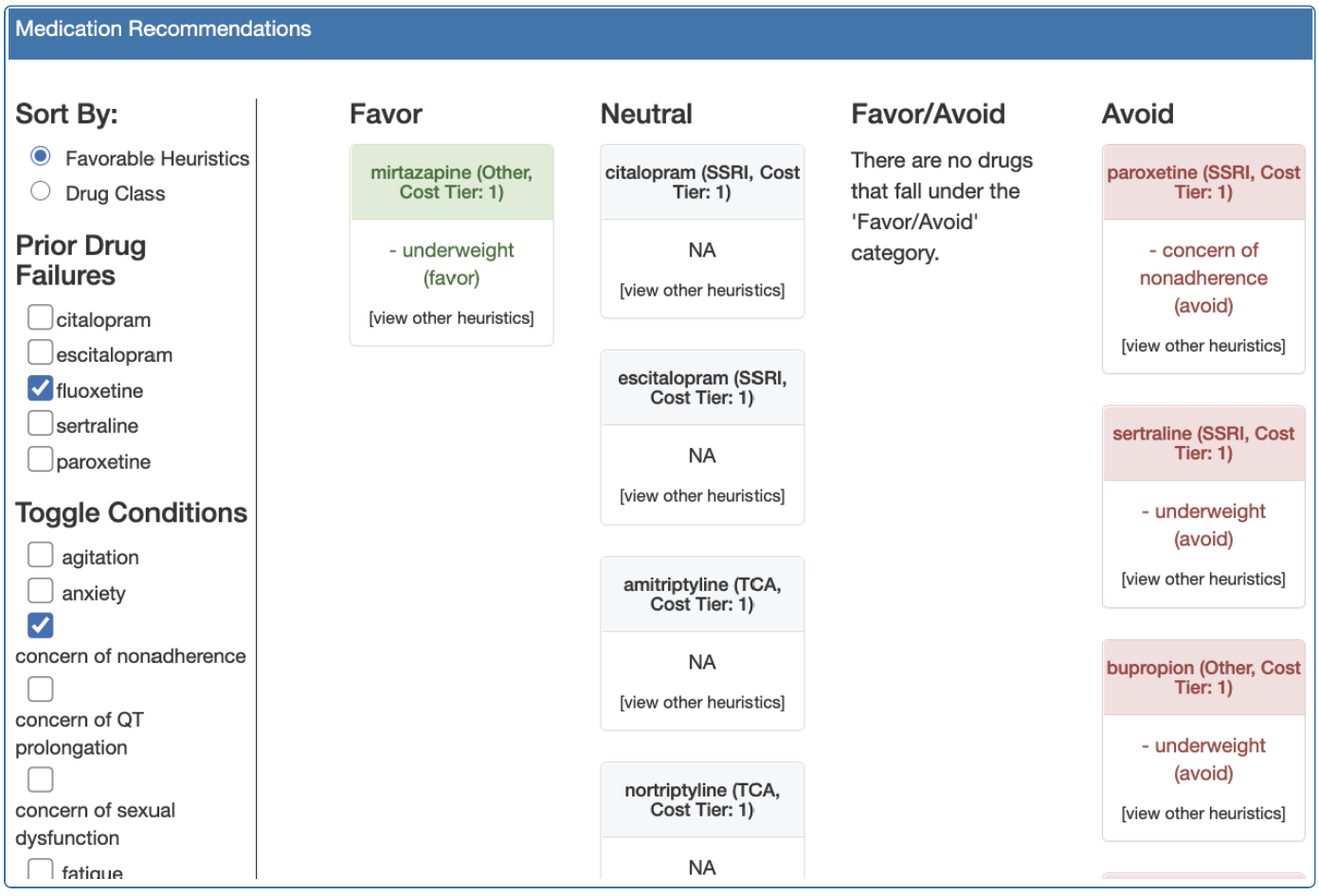 Major depressive disorder is a debilitating disease affecting 264 million people worldwide. While many antidepressant medications are available, few clinical guidelines support choosing among them. Decision support tools (DSTs) embodying machine learning models may help improve the treatment selection process, but often fail in clinical practice due to poor system integration. We use an iterative, co-design process to investigate clinicians’ perceptions of using DSTs in antidepressant treatment decisions. We identify ways in which DSTs need to engage with the healthcare sociotechnical system, including clinical processes, patient preferences, resource constraints, and domain knowledge. Our results suggest that clinical DSTs should be designed as multi-user systems that support patient-provider collaboration and offer on-demand explanations that address discrepancies between predictions and current standards of care. Through this work, we demonstrate how current trends in explainable AI may be inappropriate for clinical environments and consider paths towards designing these tools for real-world medical systems.
Major depressive disorder is a debilitating disease affecting 264 million people worldwide. While many antidepressant medications are available, few clinical guidelines support choosing among them. Decision support tools (DSTs) embodying machine learning models may help improve the treatment selection process, but often fail in clinical practice due to poor system integration. We use an iterative, co-design process to investigate clinicians’ perceptions of using DSTs in antidepressant treatment decisions. We identify ways in which DSTs need to engage with the healthcare sociotechnical system, including clinical processes, patient preferences, resource constraints, and domain knowledge. Our results suggest that clinical DSTs should be designed as multi-user systems that support patient-provider collaboration and offer on-demand explanations that address discrepancies between predictions and current standards of care. Through this work, we demonstrate how current trends in explainable AI may be inappropriate for clinical environments and consider paths towards designing these tools for real-world medical systems.
Abstract
 Major depressive disorder is a debilitating disease affecting 264 million people worldwide. While many antidepressant medications are available, few clinical guidelines support choosing among them. Decision support tools (DSTs) embodying machine learning models may help improve the treatment selection process, but often fail in clinical practice due to poor system integration. We use an iterative, co-design process to investigate clinicians’ perceptions of using DSTs in antidepressant treatment decisions. We identify ways in which DSTs need to engage with the healthcare sociotechnical system, including clinical processes, patient preferences, resource constraints, and domain knowledge. Our results suggest that clinical DSTs should be designed as multi-user systems that support patient-provider collaboration and offer on-demand explanations that address discrepancies between predictions and current standards of care. Through this work, we demonstrate how current trends in explainable AI may be inappropriate for clinical environments and consider paths towards designing these tools for real-world medical systems.
Major depressive disorder is a debilitating disease affecting 264 million people worldwide. While many antidepressant medications are available, few clinical guidelines support choosing among them. Decision support tools (DSTs) embodying machine learning models may help improve the treatment selection process, but often fail in clinical practice due to poor system integration. We use an iterative, co-design process to investigate clinicians’ perceptions of using DSTs in antidepressant treatment decisions. We identify ways in which DSTs need to engage with the healthcare sociotechnical system, including clinical processes, patient preferences, resource constraints, and domain knowledge. Our results suggest that clinical DSTs should be designed as multi-user systems that support patient-provider collaboration and offer on-demand explanations that address discrepancies between predictions and current standards of care. Through this work, we demonstrate how current trends in explainable AI may be inappropriate for clinical environments and consider paths towards designing these tools for real-world medical systems.
Additional information
Available Versions
Citation Information
Maia Jacobs, Jeffrey He, Melanie F. Pradier, Barbara Lam, Andrew C. Ahn, Thomas H. McCoy, Roy H. Perlis, Finale Doshi-Velez, and Krzysztof Z. Gajos. Designing ai for trust and collaboration in time-constrained medical decisions: A sociotechnical lens. In Proceedings of the 2021 CHI Conference on Human Factors in Computing Systems, New York, NY, USA, 2021. Association for Computing Machinery.
BibTeX